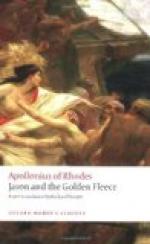There came also Augeias, whom fame declared to be the son of Helios; he reigned over the Eleans, glorying in his wealth; and greatly he desired to behold the Colchian land and Aeetes himself the ruler of the Colchians.
Asterius and Amphion, sons of Hyperasius, came from Achaean Pellene, which once Pelles their grandsire founded on the brows of Aegialus.
After them from Taenarus came Euphemus whom, most swift-footed of men, Europe, daughter of mighty Tityos, bare to Poseidon. He was wont to skim the swell of the grey sea, and wetted not his swift feet, but just dipping the tips of his toes was borne on the watery path.
Yea, and two other sons of Poseidon came; one Erginus, who left the citadel of glorious Miletus, the other proud Ancaeus, who left Parthenia, the seat of Imbrasion Hera; both boasted their skill in sea-craft and in war.
After them from Calydon came the son of Oeneus, strong Meleagrus, and Laocoon—Laocoon the brother of Oeneus, though not by the same mother, for a serving-woman bare him; him, now growing old, Oeneus sent to guard his son: thus Meleagrus, still a youth, entered the bold band of heroes. No other had come superior to him, I ween, except Heracles, if for one year more he had tarried and been nurtured among the Aetolians. Yea, and his uncle, well skilled to fight whether with the javelin or hand to hand, Iphiclus son of Thestius, bare him company on his way.
With him came Palaemonius, son of Olenian Lernus, of Lernus by repute, but his birth was from Hephaestus; and so he was crippled in his feet, but his bodily frame and his valour no one would dare to scorn. Wherefore he was numbered among all the chiefs, winning fame for Jason.
From the Phocians came Iphitus sprung from Naubolus son of Ornytus; once he had been his host when Jason went to Pytho to ask for a response concerning his voyage; for there he welcomed him in his own halls.
Next came Zetes and Calais, sons of Boreas, whom once Oreithyia, daughter of Erechtheus, bare to Boreas on the verge of wintry Thrace; thither it was that Thracian Boreas snatched her away from Cecropia as she was whirling in the dance, hard by Ilissus’ stream. And, carrying her far off, to the spot that men called the rock of Sarpedon, near the river Erginus, he wrapped her in dark clouds and forced her to his will. There they were making their dusky wings quiver upon their ankles on both sides as they rose, a great wonder to behold, wings that gleamed with golden scales: and round their backs from the top of the head and neck, hither and thither, their dark tresses were being shaken by the wind.
No, nor had Acastus son of mighty Pelias himself any will to stay behind in the palace of his brave sire, nor Argus, helper of the goddess Athena; but they too were ready to be numbered in the host.
So many then were the helpers who assembled to join the son of Aeson. All the chiefs the dwellers thereabout called Minyae, for the most and the bravest avowed that they were sprung from the blood of the daughters of Minyas; thus Jason himself was the son of Alcimede who was born of Clymene the daughter of Minyas.




